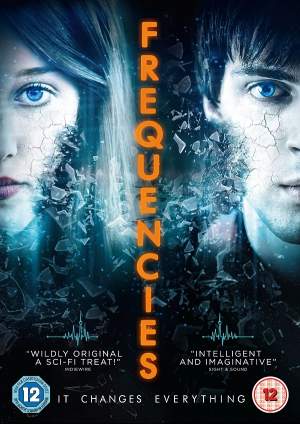
Reconnecting as adults, Zak (Daniel Fraser) is still determined to find a way to alter his and Marie’s (Eleanor Wyld) frequencies, enlisting his friend Theo (Owen Pugh). But the consequences reach further than he could possibly imagine…
Frequencies is out now on digital platforms and from today on DVD.
Here’s a clip:
The writer-producer-director, Darren Paul Fisher, talked to us about the ideas behind the film.
Where did this idea come from?
The acorn from which it grew was an obsession with luck, and how it works. Quite a few years ago I was going out with a young lady and we were at a charity event and there was a raffle. For me you buy a few tickets but you don’t stay because you never win. She said, “No no, I want to stay for the raffle because I usually win. Not usually the main prize, but a prize.” I was intrigued. We stayed to the end. I won nothing and she won a prize - there must have been about 2000 people in the audience. That got my mind ticking away. We all know those people who land on their feet in life, for whatever reason. There are people that are lucky and it’s not about what they put into the universe in terms of good feelings or karma. A raffle is just pure maths. We can’t always mathematically be lucky. That was where I had the idea of two characters, male and female, one lucky, one not, and finding a way to quantify luck. It was a very long gestation process from that idea to finished screenplay.
There’s been a lot of great low budget sci-fi recently with big ideas, like Upstream Color. Were there any specific films that influenced you?
There were three, two consciously and one more subconsciously. One was obviously Eternal Sunshine [of the Spotless Mind]. The whole Charlie Kaufmann ouvre, Being John Malkovich up, the idea of doing left-field sci-fi but very light sci-fi, one major concept whether it’s getting in John Malkovich’s head or having your memories erased. It’s about exploring relatively heavy and dry philosophical concepts but making it palatable to the audience, making it interesting.
Shane Caruth obviously, but Primer not Upstream Color. I had basically completed the film by the time Upstream Color was out, but Primer - just that you can do something fairly raw, very talky, and as long as you’ve got an authenticity to it the audience will go with you.
Obviously I’m not trying to make those movies but they were great trail blazers, showing they can work, that audiences will go to those films. I suppose the other one is Gattaca. The initial pitch for the film was along the lines of “Eternal Sunshine meets Primer with a bit of 500 Days of Summer” and that was it, I’m not telling you the story. It’s like those three, but nothing like those three. Then we just gave the producers the screenplay and said, “we’re not giving you an outline, we’re not giving you a treatment”. If they came back and said, “we don’t know what Primer is,” then they were not the right producers for the project. Most of them came back and said, “yeah, we get it, like those but nothing like those.” Which was a good sign.
It felt like a premise that you could have made more commercial, played up the romance and dumbed down the ideas, but you didn’t and I admired that. Developing it was there pressure to take it in that direction?
There was actually. Ultimately I was a producer so there was never any real pressure, but certainly when we were getting feedback at the screenplay stage it was always great but the idea was consistently floated about whether the Theo strand needed to be there, if you could take that away and go more with the romance. But I had absolutely no interest in making a straight romance. If that wasn’t in there I was not interested in making the movie at all. It was that important, that part of the film, if you took that out it becomes an unnecessary piece of work.
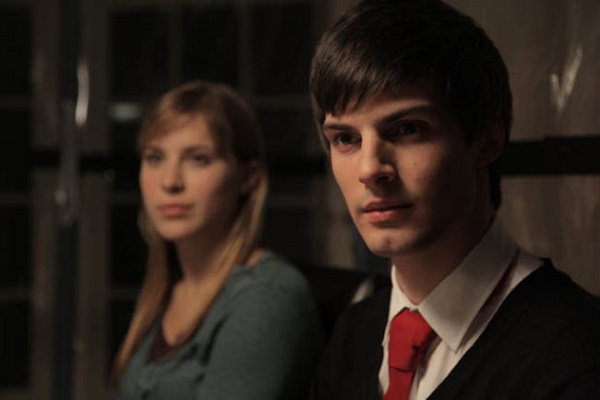
It’s tricky sometimes in this kind of film, the philosophy can swamp the sense of characters. How do you balance keeping the characters and the story real with the ideas?
Obviously there are a lot of dry concepts but the idea was always to locate that in character. Ultimately this is a simple story, at a fundamental level it’s a “boy meets girl, boy loses girl, boy gets girl back” movie. Structurally, yes, it’s very different, the ideas that it expresses are very different, but that was always a route, to locate it in what does this character want, and how is he going to get it? Which is fundamental screenwriting 101, the ideas always have to work through characters. If they couldn’t work through characters it would feel unnecessary and there’d just be two characters talking philosophy. I never wanted two characters talking philosophy.
Our major exposition scene at the dinner, we just framed it around a Guess Who’s Coming to Dinner dynamic of a guy who’s - insert racial minority here - obviously the wrong type for the daughter. The scene is basically framed around a guy trying to impress the parents. Whether you click into what he’s saying or not, that’s what the scene is trying to do and that’s the approach we took everywhere. Even at the end of the film it’s still framed in terms of the relationship. It makes it more relatable and you get what they’re coming from on more than one level.
Jumping off the Guess Who’s Coming to Dinner comparison, you can read some metaphors into the film - maybe it’s about the class system - and I was wondering what your take on that was.
As I was writing it I was aware of the parallels. Certainly, the class system, but as much as it can be read in all those different ways, actually I read it as if it’s real. If luck is quantified, what would happen? Yes it would create a class system, and then if other people want to read other metaphors into that then they can do, whether it’s racial metaphors or general exclusion. I was trying to get people to think about this idea and apply it to their life now. Although this is obviously an alternate reality, you go to a party and you see certain types of people gravitate to each other. I actually want you to not read it metaphorically. Is this at work now? Is this another level of science that we don’t understand? I would love someone to go to a party and realise “I can’t get across to the cool people, is there a scientific basis for why I can’t hang out with the cool kids?” Obviously, people read other metaphors into it. I just let the cards fall where they may and let people make up their mind about the ideas behind it.
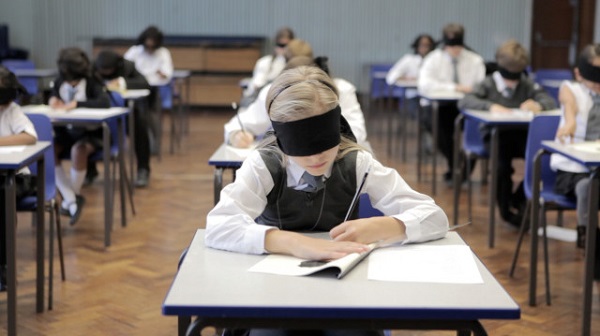
Were there any specific challenges making the film on an indie budget?
When you’re working at modest budgets you have to be careful about the size of the canvas you’re working on. It’s very close to the original vision. The compromises we had to make for budget were minor, things like Marie, when she catches the train and then walks across the road and the cars don’t hit her and she doesn’t look, that originally was a bigger piece where she was walking across a six-lane highway. It was much more ambitious visually, it was just phenomenally impractical to try to do that and in terms of narrative economy we didn’t need it. If we had unlimited money it wouldn’t have been that much bigger. It was never supposed to have huge set-pieces.
One of the reasons why we had the government agency in the bunker is another way of presenting what’s happening in the world a little bit. We could have gone into the real world a bit more and shown the influence of the Manual, but at the script stage it wasn’t a budgetary concern, it was about the purity of the scale. Being so intimate and then suddenly to go to all these characters we hadn’t met before having this experience, I was worried about diluting the tone.
I like the claustrophobia. The idea is you’re stripping Zak all the way back to nothing, so in his final moment of epiphany he’s wearing a white shirt in a white room. He literally is this non-entity in a room. The idea is his entire life he’s trying to externally solve his problems because he’s not happy with who he is, and ultimately he’s forced into a corner where he has to deal with what’s inside. Which is not a shockingly out-there concept, but we presented it quite literally. Had we gone into the world more it wouldn’t have worked as well for his arc.
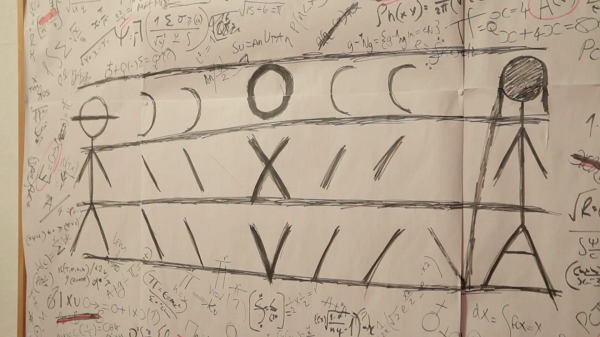
I was impressed with the consistency of the three characters over three stages of their life, how did you manage it?
I was always determined at the beginning to have a teen Zak that wasn’t an adult in a wig. There’s always the irritation in a film of someone who’s 35 trying to play 15. I really liked the idea of the three ages. We cast the adults first, and then the children, but the teens were tricky because they’re the linking age. A wide range of children will grow into a wide range of adults, but you had to feel that the teenager was that kid grown up and could also be that adult. We cast those last and that took some time.
There’s obviously artistic license, because once somebody hits 15, 16, they do not look ridiculously different to that person at 25, so it is a film cheat as much in a way as having a 25, 35, year old in a wig. We tried to make it as plausible as possible, and to cast the same sort of actors that could project that basic nature - for Zak he’s likeable, hapless, as a teen, and he’s evolved more as an adult but not too far away. Finding good actors is hard enough, and then this extra restriction… We cast for five months, for everybody, and there were a few close calls, but I’m happy with the three of them.
The reaction has been very good, and I think a lot of people like that there are three different ages. Certainly the teen audience have really related to it. A lot of them see it as a teen film, interestingly, they just see it as the teenagers getting older, even though they don’t have as much screen time. Then Dylan [Lleywellyn] got Hollyoaks after we shot, so he’s done a year of Hollyoaks now. They wouldn’t have responded in that way had it been adult actors pretending to be teens, so it opened up a very wide section of the audience to us.
Lily was amazing, she was 8 and Charlie was 10 when they did it. She self-tested from Torquay, sent in an iPhone video and we brought her in off that for the recalls. She was just a 35-year old in an 8-year old’s body, and now she’s done terrifically well, doing some big stuff like Love, Rosie and In Secret.
What’s next for you?
There’s a real time, one-take film. It’s been done before but obviously Birdman has come out and I feel there’s now going to be this oeuvre of one-take movies. It’s got a lot of sci-fi ideas in it, bigger budget than Frequencies. I’m just finishing a script which is a Steampunk heist movie, which is a bit bigger budget. Theoretically the one-take film will be next then the Steampunk heist after that, but who knows in this game. Momentum is the name of the one-take film and Hazard is the name of the Steampunk one.
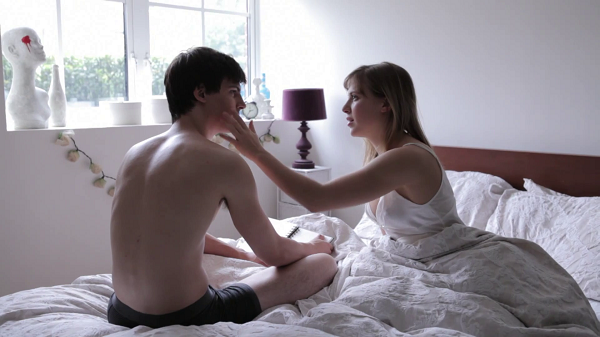
Frequencies is out now on digital platforms and from today on DVD.